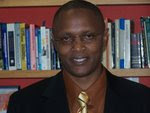Pius Njawe Noumeni, 53, a Cameroonian journalist who resisted suppression of any point of view, however vile, is dead.
Njawe died July 12, 2010 in a car crash on Interstate 664. But the many lessons he taught, core among them being accommodating to diverse opinions, however heretical, could not be silenced by the screeching trailer that ended his life.
A pioneer who started one of the first privately owned newspapers in Africa, Le Messager, Njawe maintained uncompromising stance against censorship. Yet, he demanded that journalists must have a sense of curiosity, which should consequently generate a critical mind that only trusts what can be confirmed by independent examination. This was the spirit that midwifed Le Messeger. To Njawe, journalists are messengers: drum-beaters who must warn the villagers before a storm strikes, seismographers who warn the city dwellers of an imminent quake, surgeons whose residence is a social laboratory. He knew politicians take too long to come to our aid even when we are suffocating under an economic Katrina or a political Tsunami.
These lessons must remain our guide as we pursue the ideals Njawe fought and lived for, and we must not allow for mistakes. There will be challenges along the way. But as Njawe's tough constitution showed, these challenges are not insurmountable. Even when President Paul Biya's government loved to imprison him, Njawe's resolve could only be bolstered. In a smuggled prison note, Njawe once tearfully narrated how his pregnant wife suffered a miscarriage after she was beaten by prison wardens. His wife died in car crash in Cameroon in 2002. How high price, we must ask with John Milton, is it to pay for the great boon of freedom of discussion?
When I posted a message online to mourn his passing, I received a note from one of my mentors: "Car accident always seems so suspicious for someone like this. I hope it was just an accident - rather sad to immediately think those who feared him so much might go this far." How vicious can they be to follow him across the Atlantic, I thought. But we remain suspicious because the lily-livered oppressors who feared him so much, have never given us a reason to think otherwise.
But Njawe always focused on what his country deserved: a Cameroon that would allow truth to freely wrestle with falsehood, where truth would eventually triumph, just like the Miltonian marketplace of ideas.
I met and interacted with him during my tenure at the Mayborn Graduate Institute of Journalism in Denton, TX. He was brave and optimistic. His sonorous voice commanded attention. He was eloquent - in English and French. He was a wordsmith - on paper and in speech. He possessed a mature sense of humor.
In him I saw the embodiment of Africa's resilience that thrives in spite of government callousness and insensitivity.
We spoke of a brighter future in Cameroon and in Africa. Even with what he had gone through, not once did I hear him use a condemnatory tone toward his country. He acknowledged that politicians had plunged most African countries into an abyss. He knew the abyss is deep, but not unfathomable. He knew there was work to be done in Cameroon and in Africa. That is how we must honor him: Let us go to work - For le messeger can not die, will never die. Go well, Pius. Stay well, le messeger, and Rest in Peace.



No comments:
Post a Comment